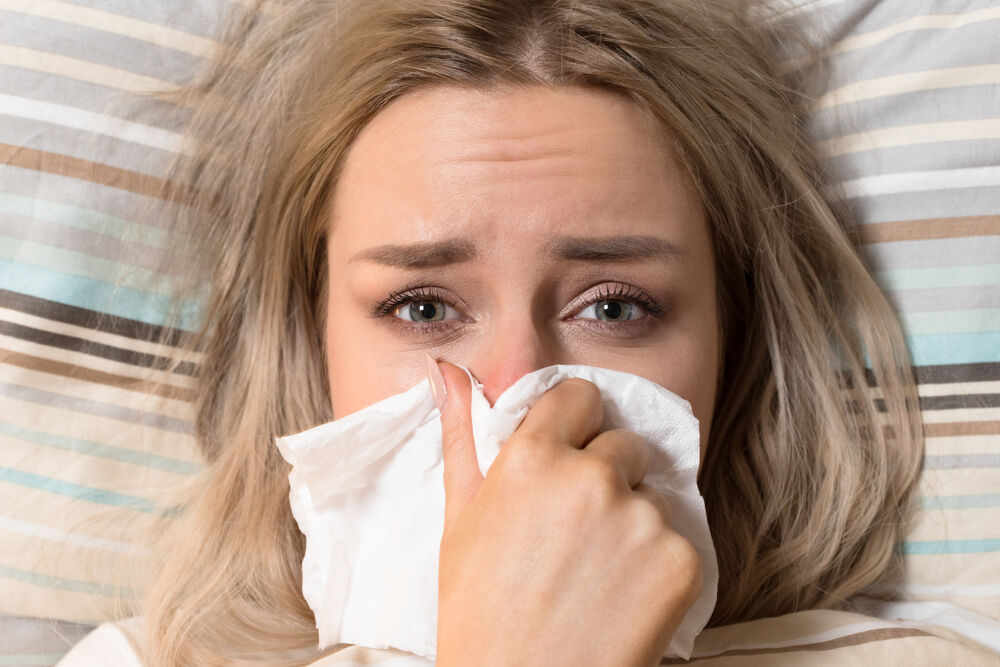A stuffy nose can turn a good night's sleep into a restless ordeal. While the importance of quality sleep is well-known, achieving it while experiencing nasal or sinus congestion presents a unique challenge. This discomfort disrupts your sleep and can impact your overall health and well-being. In this guide, we'll share effective tips on how to sleep with a stuffy nose, ensuring you still get the restorative sleep you need, even when under the weather.
Understanding Nasal Congestion
Nasal congestion, or a stuffy nose, can be caused by various factors, including the common cold, allergies, sinus infections, or weather changes. It's essential to understand the root cause of your stuffy nose to find the most effective remedy and prevent further sleep disruption.(1)
Temporary congestion, often due to a cold or allergies, usually improves within 1-2 weeks. Chronic congestion, on the other hand, might indicate an underlying health issue that requires medical attention.2 Some common causes of nasal congestion include:
- Allergies
- Hay fever
- Nasal polyps
- Chronic sinusitis
- Deviated septum
- Enlarged adenoids
- Gastroesophageal reflux disease, especially in infants
Home Remedies for Stuffy Nose
When that pesky stuffy nose strikes, there's no need to rush for over-the-counter medications. Several natural remedies can offer relief and help you breathe easier. Here are some effective options:
1. Steam Inhalation: Imagine a hot bowl of soup on a cold day. The warm steam rising from it not only warms your hands but also soothes your stuffy nose. That's the magic of steam inhalation! Breathing in warm, moist air helps loosen excess mucus and unblock your nasal passages.
- Take a Hot Shower: Before bed, hop into a hot shower and let the steamy bathroom work its magic. The warm air and moisture will loosen mucus and relieve congestion, promoting a better night's sleep.
- Facial Steam: If showers aren't your thing, you can create a DIY facial steam at home. Fill a bowl with hot water, add a few drops of essential oils like eucalyptus or peppermint (optional), drape a towel over your head, and breathe deeply for 5-10 minutes.
2. Humidifiers: Think of a humidifier as your indoor oasis. This handy appliance adds moisture to the air, which can thin mucus and make it easier to drain. This is especially helpful in dry climates or during winter when indoor heating dries out the air.
- Bedroom Bliss: Place a humidifier in your bedroom overnight to wake up to clear nasal passages and a refreshed feeling.
- Cool Mist Matters: Opt for a cool-mist humidifier, especially if you have children or pets. Warm-mist humidifiers can irritate the nasal airway.
3. Dietary Tweaks: What you eat can sometimes affect your stuffy nose. Here are some dietary tips for relief:
- Warm Up with Liquids: Sip on soothing herbal teas like ginger, chamomile, or peppermint. These warm liquids can help thin mucus and ease congestion.
- Hydration Hero: Drink plenty of water throughout the day to keep your mucus thin and flowing. Aim for eight glasses of water daily.
- Go Light Before Bed: Avoid heavy meals, dairy products, and sugary foods before bedtime. These can increase mucus production and worsen congestion while you sleep.
4. Essential Oil Therapy: The invigorating scent of essential oils like eucalyptus and peppermint can do more than just perk you up. These oils have natural decongestant properties that can help open up your nasal passages and promote easier breathing.
- Diffuser Delight: Add a few drops of eucalyptus or peppermint essential oil to your diffuser and let the aroma work its wonders.
- DIY Steam with Oils: If you're doing facial steam, add a few drops of your chosen essential oil to the hot water for an extra decongestant boost.
While these home remedies are generally safe for most people, it's always a good idea to consult your doctor before trying them, especially if you have any underlying health conditions. Also, if your stuffy nose is accompanied by fever, severe sinus pain, or other concerning symptoms, seek medical attention promptly.
Medical Interventions
While the aforementioned home remedies are usually effective for mild nasal congestion, there will be times when more intensive measures are needed. In these cases, medical interventions offer relief and address the underlying cause of your stuffy nose. Here’s what to reach for to get relief:
1. Over-the-Counter Medications:
- Decongestants: These work by constricting blood vessels in the nasal passages, temporarily reducing swelling, and easing congestion. They come in oral, nasal spray, and drop forms. However, use them sparingly, as overuse can worsen congestion in the long run.
- Oral Antihistamines: If your stuffy nose is allergy-related, antihistamines can be lifesavers. They block the histamine response, reducing inflammation and alleviating symptoms like sneezing, runny nose, and itchy eyes.
2. Prescription Medications:
- Nasal Corticosteroids: These sprays are more potent than over-the-counter options and target inflammation directly. They're effective for allergy-induced and chronic congestion, but take several days to reach full effect.
- Antibiotics: If your stuffy nose is accompanied by fever, green nasal discharge, and facial pain, it could be a bacterial infection. In such cases, antibiotics prescribed by your doctor will target the bacteria and clear the infection.
3. When to See a Doctor:
- Serious Signs: If your congestion is accompanied by high fever, severe headaches, or lasts more than a week, it's time to see a doctor.
- Chronic Conditions: Conditions like chronic sinusitis or sleep apnea can cause persistent nighttime congestion and require professional treatment.
Seeking medical advice is especially important if you find your sleep regularly disrupted due to breathing difficulties.
Sleeping Positions and Environment
Your sleeping position and bedroom environment can significantly impact your breathing ability, especially if you have a stuffy nose. Here are some tips to help you sleep better with a stuffy nose:
1. Elevate your head: Propping your head up on a high pillow can help keep your sinuses more open, making it easier to breathe. Sleeping on your back with your head elevated can also help drain mucus and relieve sinus pressure.(3)
2. Use a humidifier: A cool-mist humidifier can moisten the nasal lining and keep mucus loose, making it easier to breathe.
3. Use allergy-friendly bedding: Use hypoallergenic bedding and consider an air purifier to reduce allergens that can exacerbate nasal stuffiness.3 Stuffy nose or not, you can begin improving the breathability of your sleeping quarters by checking out the wide selection of organic and hypoallergenic mattresses, pillows, and bedding at Mancini’s Sleepworld.
4. Keep your sleeping environment clean: Ensuring your sleeping environment is clean and dust-free can significantly reduce nighttime stuffiness.
5. Try acupressure: Acupressure, a type of massage targeting pressure points in the body, may also be a helpful sleep aid for those with a stuffy nose
Dealing with a stuffy nose at night can be frustrating, but with these tips, you can breathe easier and enjoy a restful sleep. Adjust your sleeping environment, experiment with different pillows, and consider your overall health. If you're looking for the perfect pillow to elevate your head and ease congestion, explore the options at Mancini’s Sleepworld, where comfort meets quality. Don't let a stuffy nose rob you of a good night's sleep; try these methods and seek professional help if needed. Remember, getting better sleep is key to better health.
Sources:
1. Healthline Media. What Causes a Stuffy Nose? https://www.healthline.com/health/nasal-congestion
2. Mayo Clinic. Nasal congestion: Sometimes more than just a stuffy nose. https://www.mayoclinic.org/symptoms/nasal-congestion/basics/causes/sym-20050644
3. Enticare Ear, Nose, and Throat Doctors. Best Position to Sleep with a Stuffy Nose. https://enticare.com/2021/10/12/best-position-to-sleep-with-stuffy-nose/

